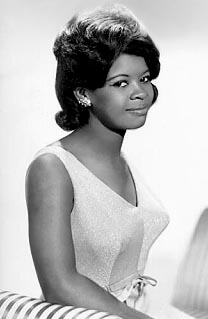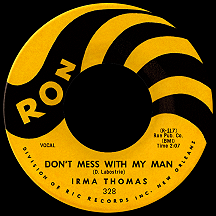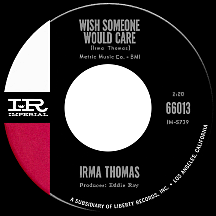IRMA THOMAS
Wish Someone Would Care
In a sense, Irma Thomas started with the same job she will eventually end with: singing, of course! In between she worked as a restaurant dish washer, wife, mother, waitress, department store clerk, auto parts salesperson, wife again, mother again, nightclub owner, occasional cook, grandmother...the activities, burdens, pleasure and pain of a well-rounded, eventful life. Some of us may feel it would have been better if the "Soul Queen of New Orleans" had just done the one thing. But it's good to have a variety of experiences, especially if they include a successful career in music. And besides, she hadn't always been referred to in such glowing terms. Not that she didn't deserve to be!
She was born Irma Lee in 1941 in the small town of Ponchatoula, just north of the lakes that divide New Orleans from the much larger upper portion of Louisiana. Exposed to the blues as a youngster by the 78s her father owned, his preference for male singers like John Lee Hooker, Lightnin' Hopkins, Percy Mayfield and B.B. King became hers as well. Several years later, after moving to the Crescent City, she sang "The Tennessee Waltz" as part of a school presentation of Cinderella, modernizing a scene where the title heroine shared a dance with Prince Charming. From the beginning of her schooling, Irma had no hestitations about performing onstage. She participated in school productions at every opportunity, particularly if they let her sing. Those plays prepared her in the best way for what became an eight-decade career.
Church was her favorite place, though she soon discovered other outlets for her interest in music. The Ritz Theater on LaSalle Street, for example, held regular talent shows and age was not an issue; pre-teen Irma competed four times before taking first place and receiving the substantial five dollar prize. A detour was taken just three years later: pregnancy forced her into an early adulthood. Her father insisted she quit school, accept her responsibility and marry the young boy. This arrangement, not surprisingly, was short-lived; she had to take a job as a dish washer for 50 cents an hour and found great joy in singing with a gospel quartet every Sunday. By age 17 she was married again, this time for what she thought were the right reasons. Life weighed heavier when two more children came along; another restaurant job kept her busy on the graveyard shift while her mother took care of the kids. The boss had strict rules about employees making any kind of noise. Irma sang during working hours because...well, she couldn't help herself! It was all the excuse he needed to discharge her.
A waitress job at the Pimlico Club, where many regional jazz and blues artists performed, was a turning point in her life, though it may not have seemed so at the time. It's a story Irma has told many times in interviews: in 1959, singer Tommy Ridgley (who'd been in Dave Bartholomew's band and had recorded for the Imperial, Atlantic and Herald labels) called her up on stage to sing with him, after which customers began asking for the singing waitress they'd heard about. She was told to stick to waitressing - no singing. The warning wasn't heeded and the manager fired her. Lucky break this time! Ridgley claimed he could get her an audition with a record company and even took her to the offices of Joe Banashak's recently-established Minit Records, where producer Allen Toussaint turned her down flat. So she auditioned for Joe Ruffino's Ric and Ron operation and was immediately scheduled for a recording session.
"Don't Mess With My Man" was recorded and released on Ron in the fall of '59. Written by Dorothy LaBostrie (a local songwriter who'd established herself several years earlier with "Tutti Frutti" by Little Richard), its lyrics, while somewhat scandalous, addressed a certain reality ('You can have my husband, but please don't mess with...') that resonated with a large enough audience to get it into the national R&B top 30 for several weeks in the early months of 1960. After one more Ron disc, she was approached by the suddenly-interested Banashak and Toussaint and signed with them for one main reason: Minit was distributed nationally by Imperial Records, a better bet for gaining exposure outside the region. Her Minit recordings came straight from R&B heaven; Cosimo Matassa's studio on Governor Nicholls Street was home base for the city's hottest musicians and had already built a stellar decade-long track record.
Minit assembled its own impressive roster (Jessie Hill, Ernie K-Doe, Aaron Neville, The Showmen and Benny Spellman had hits in the early '60s) and Toussaint produced them all. His productions took a variety of approaches, highlighting Irma's sweetly resonant tones against bright arrangements in stereo (not yet used in many Big Easy recordings of the time). "Girl Needs Boy," the first of these, was perhaps too far removed from the audacious blues feeling of her Ron recordings. A sensitive rendition of Deborah Chessler's late-'40s classic "It's Too Soon to Know" lost a head-to-head battle with a version by established hitmaker Etta James in late '61. Toussaint was determined to take Irma to another level, toning down her obvious blues chops with a pop sensibility in order to establish her as a mainstream performer; the result was a "soul" sound all her own that ran a little ahead of the prevailing curve.

The fourth Minit single, "It's Raining," was created in the studio; Toussaint made up lyrics on the fly ('About to blow my top...I wish this rain would hurry up and stop...' suggested mother nature was interfering with romance). The song connected with local fans and has remained one of her most-requested songs throughout the years. Miss Thomas bonded with session players like pianist Eddie Bo and saxophonists Alvin "Red" Tyler and Lee Allen, gaining confidence and vocal power as time progressed. Toussaint's "Ruler of My Heart" is a highlight, with its distinctive tinkling piano and an impassioned vocal ('Come back, come back...I've had enough...'); her performance of the song as an opening act for Otis Redding prompted him to rework it, sentiment intact and with a similar chord structure, as "Pain in My My Heart." Released a few months later in the fall of 1963, it became one of Redding's most popular songs.
Around this same time, Imperial founder Lew Chudd (who'd purchased Minit from Banashak a few months earlier) sold his entire operation to Liberty Records. The new owners moved Irma to the Imperial roster, where there would be greater promotional possibilties. The push was on to get her a major pop hit. There was a certain amount of risk; she was taken from the familiarity of Cosimo's and put into studios in New York and Los Angeles. Irma, whose professional insticts had been evolving since third grade, settled in very quickly with producer Eddie Ray, arranger H.B. Barnum and fabulous backing singers like The Blossoms and The Sweet Inspirations. She thrived in this situation and achieved the best possible outcome: a big hit with a song she wrote herself. The lyrics of "Wish Someone Would Care" were very personal ('Smiles, smiles hide lots a things...the good, the bad, the hurt...'), having to do with depression stemming from her second divorce (her husband's attitude towards her career: stay home and take care of the children full-time). Yet Irma chose her career...and children. Marriage number two was over.
"Wish Someone Would Care" was the biggest hit of her career, reaching the pop top 20 and number two on the rhythm and blues charts in May 1964. Its flip, by the way, dealt with similarly stressful issues but did so to a lively, danceable beat. "Break-A-Way" (penned by Jackie DeShannon and Sharon Sheeley) is an A-side-equivalent delight. The next single, as strong as the previous two-sider, should have risen to the level of its predecessor. "Anyone Who Knows What Love Is (Will Understand)," a haunting, incredibly well-produced track, furthered the heartbreak scenario (and enjoyed a notable comeback a half-century later via its use in movies and TV series). At the time, its B side made a greater impact; "Time is on My Side," composed by Jerry Ragovoy (using the pen name Norman Meade), debuted in a 1963 version by trombonist Kai Winding with vocalists The Gospelaires (including sisters Dionne and Dee Dee Warwick and their aunt, Cissy Houston). Lyrics by Jimmy Norman were added for Irma's version and within months The Rolling Stones covered the tune, notching their first U.S. top ten hit with it.
East coast singer-songwriter Van McCoy penned a pair of soulfully sensitive numbers for Irma, "Times Have Changed" and "He's My Guy," that became mid-charting R&B hits in the latter half of 1964. A series of releases took her through the summer of '66; "It's a Man's Woman's World" (an answer to James Brown's hit "It's a Man's Man's Man's World") was her final Imperial single. Signing with Chess, she made several recordings with producer-arranger Rick Hall at the FAME studio in Muscle Shoals, Alabama. Ironically, Irma's final national chart single came from the pen of the guy who had "borrowed" one of her songs a few years before; "Good to Me" had the same style of arrangement as many of Otis Redding's best hits, unsurprising since it was made in the same spot, with many of the musicians Otis had worked with. It had a brief run on the R&B charts in early 1968.
Records appeared on many labels, many of them small companies in New Orleans, over the next couple of decades, though there was one single ("Full Time Woman") issued on Atlantic subsidiary Cotillion in 1972. When times got tough, she supported herself and her family by working at a number of retail jobs. She returned to New Orleans and later, with manager and third husband Emile Jackson, opened a nightclub, the Lion's Den (sometimes she prepared the food!), which operated successfully...until Hurricane Katrina took its devastating toll in the summer of 2005.
Since '86 she had been signed to Rounder Records (a label staffed with people who appreciate traditional and just plain great music). Ten albums were recorded over more than two decades, including four that received Grammy nominations in the category Best Contemporary Blues Album. After the Rain, a 2006 post-Katrina LP, won the award the following year. Irma Thomas is still doing what she was born to do, surrounded by family, friends and fans in the city she loves. "Soul Queen of New Orleans" is a distinction that can't be disputed.



